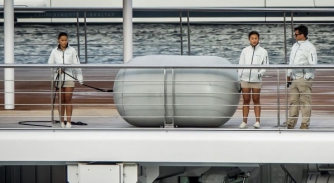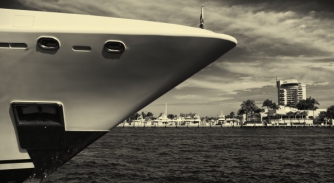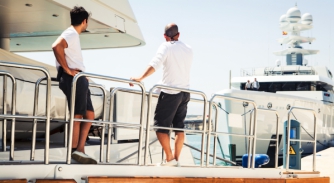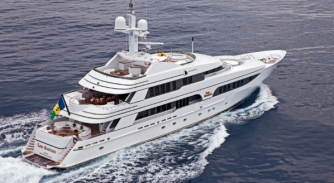Advice for crew on Russian-linked superyachts
PYA has provided some advice and useful contact information for superyacht crew on Russian vessels…
There are concerns among some of our PYA members regarding their legal and financial status if they are working on yachts that are Russian flagged or are owned by Russian individuals or Russian entities. The current crisis is a constantly evolving situation, and we are all in uncharted waters. The PYA is following the situation closely and has been in direct contact with its legal adviser, and with three REG members - MCA, Cayman Islands and the Isle of Man. We are also offering crew free personalised advice via our PYA Member Assistance Service, plus a discount on our membership (see details below).
Moving a Russian-linked yacht
Recently, the Cayman Islands Shipping registry office in the South of France has received calls from some captains and crew on yachts with Russian connections, currently in Italian ports, who are worried about the implications if they were to assist in moving these yachts from Italy into international waters or “safe havens”. Some Russian-connected yachts have already arrived in the Maldives and Montenegro, however, their ultimate “haven” there may not be assured.
Provided that a yacht has not been formally placed under a detention order by flag or port state, and complies with all normal departure procedures, then moving a yacht from A to B in compliance with orders from the usual operational command centre would not place the crew in legal jeopardy. Moving, or attempting to move, a yacht that is under formal detention would constitute a serious offence. The UK has recently announced that it has banned Russian-linked vessels from docking at any of its ports, whereas the EU is still allowing the entry of Russian-linked vessels which are not subject to sanction.
Crew on sanctioned vessels
Overall, the legal situation is that the owner of a vessel is the person or entity listed as such on their vessel's Certificate of Registry. Crew may be employed by the vessel owner, or more commonly by an offshore “cell” entity. They may or may not know the identity of the yacht’s beneficial owner(s). Where such owners have been identified and sanctioned by state authorities, their assets, including yachts, face denial of access to the said owners or their representatives. This likely means that, in the case of a sanctioned yacht, the crew would, after an uncertain period, be required by the local port state officials to leave the vessel, which would then become a “Navire Désarme”. The concerns for crew members then become (i) where do they go next, and (ii) how to recover any outstanding wages.
Leaving a sanctioned vessel
In answer to (i) above, there will be several factors to consider. If the yacht is in an EU port, then EU crew on board are free to consider whether to go home, or travel to or remain in an EU port where they can seek new employment while dealing with recuperation costs and unpaid wages. Non-EU crew with or without Schengen visas and whose 90 days have not expired, may also return to or remain in the EU, but they have no right to approach crew agencies or otherwise seek new employment. Legally, they need to return home and apply for a new job from there. To avoid any entanglement with the vagaries of US immigration laws, non-US crew on a sanctioned vessel in a US port should, if required to leave such vessel, leave the US as soon as possible. However, as US immigration regulations require all crew to hold a valid visa to enter a port, there should be no issue leaving the vessel.
Russian nationals would find themselves in a particularly invidious situation on a sanctioned vessel and their best course of action would be to return home as soon as possible and by any means.
Repatriation costs
Repatriation costs should be paid by the yacht owner. In the case of commercially registered yachts, insurance coverage is compulsory to cover such costs in the event of an owner’s inability to do so. However, access to such pay-out may not be a simple process for any individual crew member. The flag state then has a responsibility to assist the stranded seafarer with repatriation. If the flag response is slow or is unforthcoming, one’s consulate would normally assist with repatriation, or the port state may intervene to assist in returning the crew home. (In the foregoing scenarios, the flag, consular or port state authorities would then have the option to recover costs from the insuring entity).
Recovery of unpaid wages
With regard to concern (ii), unpaid wages (including leave and any other contractual benefits) may only be recovered after the fact. No pre-emptive action is possible by any port or flag state authority, or by any seafarers’ organization of any kind. In order to protect their claims, seafarers should remain with the vessel as long as possible, and assemble a portfolio of evidence of entitlement to wages. Documentation should include, but not be limited to, a SEA or other contract, previous payslips, copies of relevant notations in the Official Log Book, copies of crew lists, and copies of any crew uniform issuance list(s) on which their signature occurs. The PYA is working with Maritime Lawyers who can provide our members with further assistance to claim unpaid wages.
Free advice - PYA’s Member Assistance Service (MAS)
In any situation involving crew’s unpaid or disputed wages, if there is no satisfactory outcome achieved by the efforts of the captain or management company, the next port of call is flag state. Exceptionally, e.g. in France under specific circumstances, port state may enforce payment of retained wages. Regardless, our members should also contact the PYA office for reference to our Member Assistance Service (MAS), which is a free service available to all crew, including non-members. This service has a track record of successfully resolving wage disputes, and is totally private and exclusively confidential between only the parties concerned. There is no public disclosure of the identities of the crew, owner, management or yacht, thereby protecting the reputation and career path of our involved member.
(It is only during extremes, such as an entire crew remaining unpaid by an intransigent or vanished yacht owner, that resolution can only be obtained by resort to court action, with its attendant undesirable publicity).
Please note, we will be following up shortly with some additional advice.
Useful contact details
PYA’s Member Assistance Service (MAS): advice@pya.org
French Mediterranean Coastguard: +33 (0) 970278692
Flag states
Cayman Islands Shipping Registry: France (Valbonne): +33 (0) 489027609
Marshall Islands Registry: yachtcrew@register-iri.com
Virgin Islands Shipping Registry: 1(284)-468-9646 |
vishipping@bvimaritime.vg
Transport Malta: +356 21222203
Red Ensign Group: REGsecretariat@mcga.gov.uk
Help the PYA Support Crew in Need
Profile links
Professional Yachting Association
NEW: Sign up for SuperyachtNewsweek!
Get the latest weekly news, in-depth reports, intelligence, and strategic insights, delivered directly from The Superyacht Group's editors and market analysts.
Stay at the forefront of the superyacht industry with SuperyachtNewsweek
Click here to become part of The Superyacht Group community, and join us in our mission to make this industry accessible to all, and prosperous for the long-term. We are offering access to the superyacht industry’s most comprehensive and longstanding archive of business-critical information, as well as a comprehensive, real-time superyacht fleet database, for just £10 per month, because we are One Industry with One Mission. Sign up here.
Related news

“We’re suspending all projects on yachts affiliated with the Ukraine crisis”
M/Y Crew Agency publicly states its intention to cease business with yachts affiliated with the Ukraine crisis
Crew

Freezing not seizing
Why the distinction between freezing and seizing is important to understand the application of sanctions in Europe
Business

What does it mean for a yacht to be seized?
Duncan Bateson, Partner at Ince, gives insight into the latest developments related to Russia, sanctions and the superyacht industry
Business


Crew on Russian-owned superyachts urged to join trade union
Industry stakeholders have banded together to urge crewmembers to sign up to Nautilus International
Owner

Superyacht crew turn against Russian owners
The ongoing conflict in Ukraine has led to crew turning their back on and even sabotaging Russian owned superyachts
Crew
Related news
Freezing not seizing
3 years ago
What does it mean for a yacht to be seized?
3 years ago
A Swift Exit
3 years ago
Superyacht crew turn against Russian owners
3 years ago
NEW: Sign up for
SuperyachtNewsweek!
Get the latest weekly news, in-depth reports, intelligence, and strategic insights, delivered directly from The Superyacht Group's editors and market analysts.
Stay at the forefront of the superyacht industry with SuperyachtNewsweek



